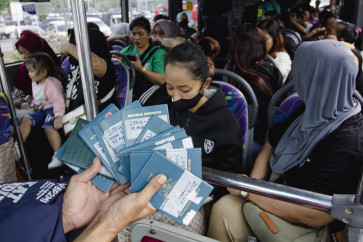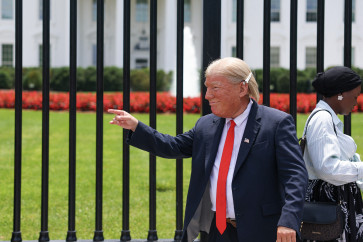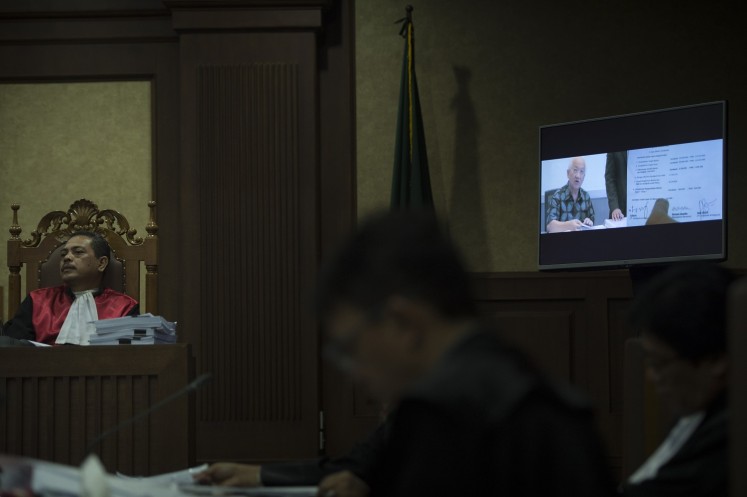Popular Reads
Top Results
Can't find what you're looking for?
View all search resultsPopular Reads
Top Results
Can't find what you're looking for?
View all search resultsPeople-to-people diplomacy: Foundation of Taiwan-Indonesia relations
This form of diplomacy is particularly relevant since Indonesia and Taiwan do not have formal diplomatic relations. Due to the One China Policy, Indonesia only recognizes the People’s Republic of China.
Change text size
Gift Premium Articles
to Anyone
 “People are the foundation of all countries,” said Professor Samuel C. Y. Ku from Sun Yat-Sen University in a seminar titled “Indonesia-Taiwan People to People Relations” held at Bina Nusantara University today. (Binus University/-)
“People are the foundation of all countries,” said Professor Samuel C. Y. Ku from Sun Yat-Sen University in a seminar titled “Indonesia-Taiwan People to People Relations” held at Bina Nusantara University today. (Binus University/-)
International relations does not only happen between states, but also between people.
“People are the foundation of all countries,” said Professor Samuel C. Y. Ku from National Sun Yat-Sen University in a seminar titled “Indonesia-Taiwan People to People Relations” held at Bina Nusantara University today.
Referencing a range of academic sources, from Joseph Nye’s concept of Smart Power, Taro Aso’s Value Oriented Democracy, to the neo-functionalism theory of Ernst Haas, Prof. Ku emphasized the importance of people-to-people diplomacy.
This form of diplomacy is particularly relevant since Indonesia and Taiwan do not have formal diplomatic relations. Due to the One China Policy, Indonesia only recognizes the People’s Republic of China. Therefore, people-to-people connections are significant for Indonesia and Taiwan.
“People-to-people relations are the cornerstone of Taiwan’s international relations,” said Professor Ku.
The leading indicators of the success of Taiwan and Indonesia’s people-to-people relations are trade, investment, migrant workers, education, tourism, democratic values and NGOs.
There are currently more than 200 thousand Indonesians working, and 3,065 Indonesians studying in Taiwan. Ku called these students the ‘invisible agent’ of the people-to-people diplomacy.
Indonesia and Taiwan both experienced the transition from semi-authoritarian political regimes to a democracy, in the late 90s and late 80s respectively.
However, there has been a decline of interest in Taiwan regarding Indonesia.
The number of people coming from Taiwan to Indonesia is slightly declining, compared to the increasing number of Indonesian tourists to Taiwan.
Prof. Ku attributed the drop to the aggressive promotion of the Japanese tourism industry, and also the depreciation of Japanese Yen to Taiwan New Dollar. “It’s not that Taiwanese do not like Indonesia, it’s that there are other options.”
Kendra Y. S. Chen from Taipei Economic and Trade Office (TETO) argued that there were many countries that Taiwanese could visit due to free-visa regulations.
The same problem also happens in education. While there are many Indonesian students in Taiwan, there are no Taiwanese students in Indonesia. TETO Education Attache Tony S. P. Lee argued that there was a lack of promotion on Indonesia’s behalf and that the students preferred to go to the US or Europe. “Taiwanese students are not facing the Southeast Asia,” he added. (dan)
---------------
We are looking for information, opinions, and in-depth analysis from experts or scholars in a variety of fields. We choose articles based on facts or opinions about general news, as well as quality analysis and commentary about Indonesia or international events. Send your piece to community@jakpost.com.









